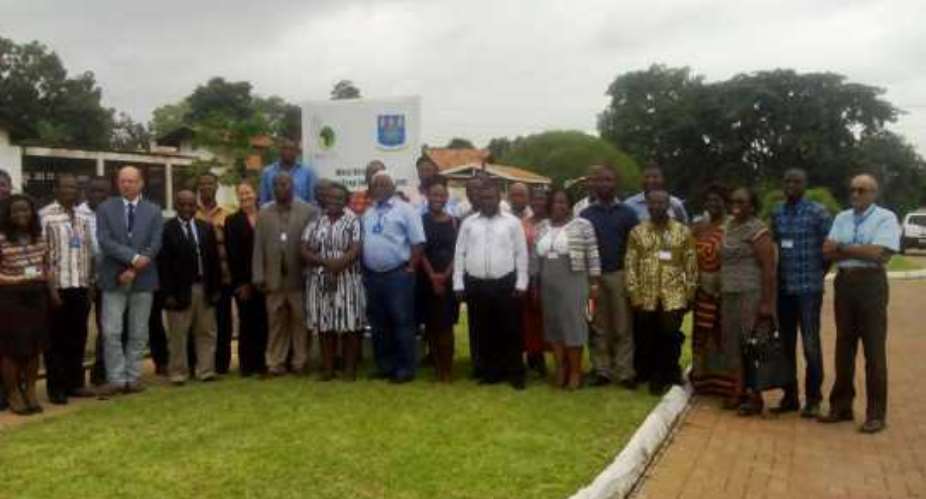Accra, June 26, GNA - The West Africa Centre for Crop Improvement (WACCI), has launched a Vegetables Innovation Laboratory (VIL) as part of efforts to beef up vegetable production and food security in Ghana and the sub-region.
The VIL thematic areas include genetic improvement, vegetable production and quality control, processing, value chains and socio-economic research, policy research and knowledge management systems.
At the launch in Accra as part of a two-day workshop on Tomato Value Chain in Ghana at the University of Ghana, Professor Eric Y. Danquah, the Director, WACCI/Biotechnology Centre, said the lack of breeders in Ghana was hampering the growth of the tomato industry in Ghana.
He said currently the Crops Research Institute at Fumesua had only two vegetable breeders who lacked expertise in the use of technologies needed to accelerate the development of superior tomato varieties for a changing sub-region and emerging markets for the benefit of Ghanaians.
The workshop, which was organized by the centre in collaboration with Syngenta Foundation for Sustainable Agriculture, brought together 35 renowned research scientists and stakeholders in the tomato industry from across the globe.
It sought to create awareness about the proposed WACCI Vegetable Innovation Lab; explore the possibility of establishing a public-private consortium in West Africa that raises tomato productivity through an integrative research approach underpinned by science and technology and to develop a strategy for accelerating a successful tomato industry in Ghana.
Professor Danquah said for Ghana to make a head way in tomato production, there was the need for government to train breeders, and to give priority to its production.
Prof Danquah said tomato was a research neglected crop compared to the cereals, and the root and tuber crops in West Africa.
However, it was more than gold, and that a country like Burkina Faso was doing well in its production.
He said although Ghana was capable of self-sufficiency in tomato production, it depended largely on imports from neighbouring countries such as Burkina Faso.
The Director noted that through a public-private partnership, challenges facing the tomato value chain in Ghana could be addressed.
He said the Research Initiative covered genetic analysis of productivity traits in tomato for improved adaptation to low input production conditions and genetic improvement for enhanced yield under all the stresses.
It also included the development of heat-tolerant, high yielding and consumer acceptable varieties of tomato for off-season production.
Prof Danquah said WACCI, which was one of the World Bank's African Centre of Excellence would receive eight million dollars from the Bank by next August; thus providing the springboard for transforming the Centre into a sustainable African Centre of Excellence for training Plant Breeders and Seed Scientists and Technologists.
WACCI was established in 2007 as a partnership between the University of Ghana and Cornell University, USA with initial funding from the Alliance for a Green Revolution in Africa to train plant breeders, at the Doctorate level with expertise to improve the indigenous crops that feed the people of the sub-region.
Since inception, the Centre has enrolled 82 students from 12 African countries; of which 52 per cent are Anglophone and 48 Francophone. Of the total number, women form 37 per cent.
Prof Ebenezer O. Owusu, the Provost, College of Basic and Applied Sciences, University of Ghana, lauded the success story of Burkina Faso in tomato production, adding that Ghana was capable of doing same.
Dr Vivienne Anthony, Senior Scientific Advisor, Syngenta for Sustainable Agriculture, a Swiss non-governmental organization, said there was the need for a demand-led plant variety design for emerging markets in Africa.
She said the organization would continue to support public breeders to raise productivity and quality of new varieties to meet the needs of smallholder farmers, value chains and consumers.
Dr Peter van der Toorn, Global Head Breeding Vegetables, Syngenta Seeds, said technology was essential in plant breeding in order to ensure food security.
Mrs Esther Agyekum of the Crop Services Directorate at the Ministry of Food and Agriculture, said Ghana depended largely on regional imports for vegetables during the off season, with imports between 70,000 - 80,000 tons of fresh tomatoes from neighboring countries.
Mrs Agyekum said challenges facing the sector were budgetary constraints, late release of funds and inadequate and inconsistent reliable data base in respect of tomato production and marketing.
She observed that centres of excellence in tomato production were being earmarked for the Akumadan, Vea, Dawhenya Irrigation Schemes and the Vakpo Horticultural Centre.
GNA





 We’ll no longer tolerate your empty, unwarranted attacks – TUC blasts Prof Adei
We’ll no longer tolerate your empty, unwarranted attacks – TUC blasts Prof Adei
 Bawumia donates GHc200,000 to support Madina fire victims
Bawumia donates GHc200,000 to support Madina fire victims
 IMF to disburse US$360million third tranche to Ghana without creditors MoU
IMF to disburse US$360million third tranche to Ghana without creditors MoU
 Truck owner share insights into train collision incident
Truck owner share insights into train collision incident
 Paramount chief of Bassare Traditional Area passes on
Paramount chief of Bassare Traditional Area passes on
 Two teachers in court over alleged illegal possession of BECE papers
Two teachers in court over alleged illegal possession of BECE papers
 Sunyani: Victim allegedly shot by traditional warriors appeals for justice
Sunyani: Victim allegedly shot by traditional warriors appeals for justice
 Mahama vows to scrap teacher licensure exams, review Free SHS policy
Mahama vows to scrap teacher licensure exams, review Free SHS policy
 Government will replace burnt Madina shops with a new three-story, 120-store fac...
Government will replace burnt Madina shops with a new three-story, 120-store fac...
